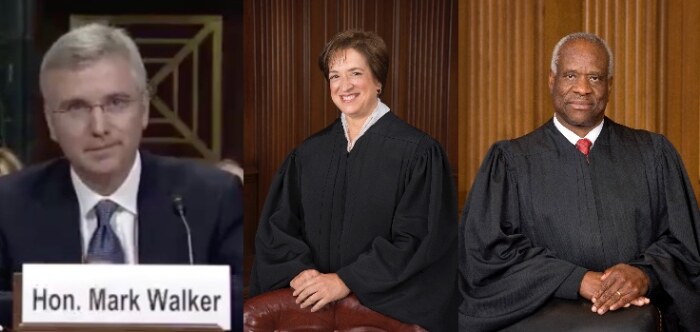Rick Morain is the former publisher and owner of the Jefferson Herald, for which he writes a regular column.
Three federal judges have made the national news recently.
One of them is not like the others.
U.S. District Court Chief Judge Mark E. Walker recused himself last week from overseeing Walt Disney Company’s lawsuit against Republican Governor Ron DeSantis.
DeSantis’ lawyers had requested that Judge Walker, an appointee of former President Barack Obama, do just that. They claimed Walker’s comments in two previous unrelated cases revealed bias on Walker’s part against DeSantis.
Walker dismissed the DeSantis attorneys’ claim. He found it to be “a misapprehension of the law and a misstatement of the facts.” He accused them of “rank judge-shopping,” a practice that, sadly, “has become all too common in this district.”
But Walker did disqualify himself from the Disney case. The reason? He had learned the previous week that one of his relatives “within the third degree of relationship” owns 30 shares of stock in The Walt Disney Company. Walker said that relative could be “substantially affected by the outcome of this case.”
So he stepped back from further proceedings. The case was reassigned to Judge Allen C. Winsor, an appointee of former President Donald Trump.
The “third degree of relationship”? That would be Judge Walker’s first cousin, great-grandparent, great-aunt, great-uncle, great-niece, great-nephew, great-grandchild, half-aunt, or half uncle. Not a close relative, but in Judge Walker’s opinion, reason enough for him to recuse himself.
The second judge in the news was U.S. Supreme Court Justice Elena Kagan. Last month it was revealed that some of her longtime high school friends wanted to spring for some New York bagels and lox for a get-together with her.
Kagan refused. She said the bagels and lox gift, trivial as it might seem, crossed the bounds of what judicial ethics would allow her to accept.
Some servants of the law take their ethical responsibilities seriously. Judge Walker and Justice Kagan are two of those.
The third judge in the news recently is U.S. Supreme Court Justice Clarence Thomas. For more than 20 years, it turns out, he has accepted highly valuable gifts and luxury travel, all expenses paid, from billionaire Republican megadonor Harlan Crow of Dallas, ProPublica revealed in April. Those include, but are certainly not limited to, vacations on Crow’s superyacht, trips on Crow’s Bombardier Global 5000 jet, and a week every summer at Crow’s private lakeside resort, Camp Topridge, in the Adirondacks in upper New York State.
At the resort Justice Thomas regularly rubbed shoulders with Crow’s guest list of corporate executives and conservative political activists.
For his own reasons, Justice Thomas never disclosed any of the gifts, trips, or vacations.
But wait, there’s more. Justice Thomas has a grandnephew whom he had raised since the boy was 6. Crow paid for a year of the grandnephew’s schooling at Hidden Lake Academy in the north Georgia foothills and a year at Randolph-Macon Academy in Virginia, both exclusive private academies, ProPublica reported in May. There may have been additional years as well. The cost of the two years of academy schooling would have been about $100,000—none of it disclosed.
And then there were Justice Thomas’ real estate sales to Crow, also undisclosed.
I know, I know—such gestures don’t rise to the level of contributing New York lox and bagels, but you would think they would warrant some passing mention by Justice Thomas.
One of these three wearers of the robe is not like the others.
Editor’s note: The Washington Post reported on June 7, “Supreme Court Justice Clarence Thomas has asked for more time to file annual financial disclosures after criticism that he did not report luxury travel and real estate deals with a Texas billionaire and Republican donor.”
Top image, from left: Mark E. Walker (screenshot from his 2012 nomination hearing in the U.S. Senate Judiciary Committee; official portrait of U.S. Supreme Court Justice Elena Kagan (Collection of the Supreme Court of the United States); official portrait of U.S. Supreme Court Justice Clarence Thomas (Collection of the Supreme Court of the United States).


2 Comments
Very nicely done...
…and my compliments to Rick Morain.
PrairieFan Fri 9 Jun 5:24 PM
Constructive Comparisons
Thanks Rich. When you compare and contrast, you helped us distinguish the nature of Judge Thomas’s situation. Perhaps, add Fortas to the next list of comparisons. The Trump indictment calls for similar comparisons.
iowaralph Fri 16 Jun 5:13 PM